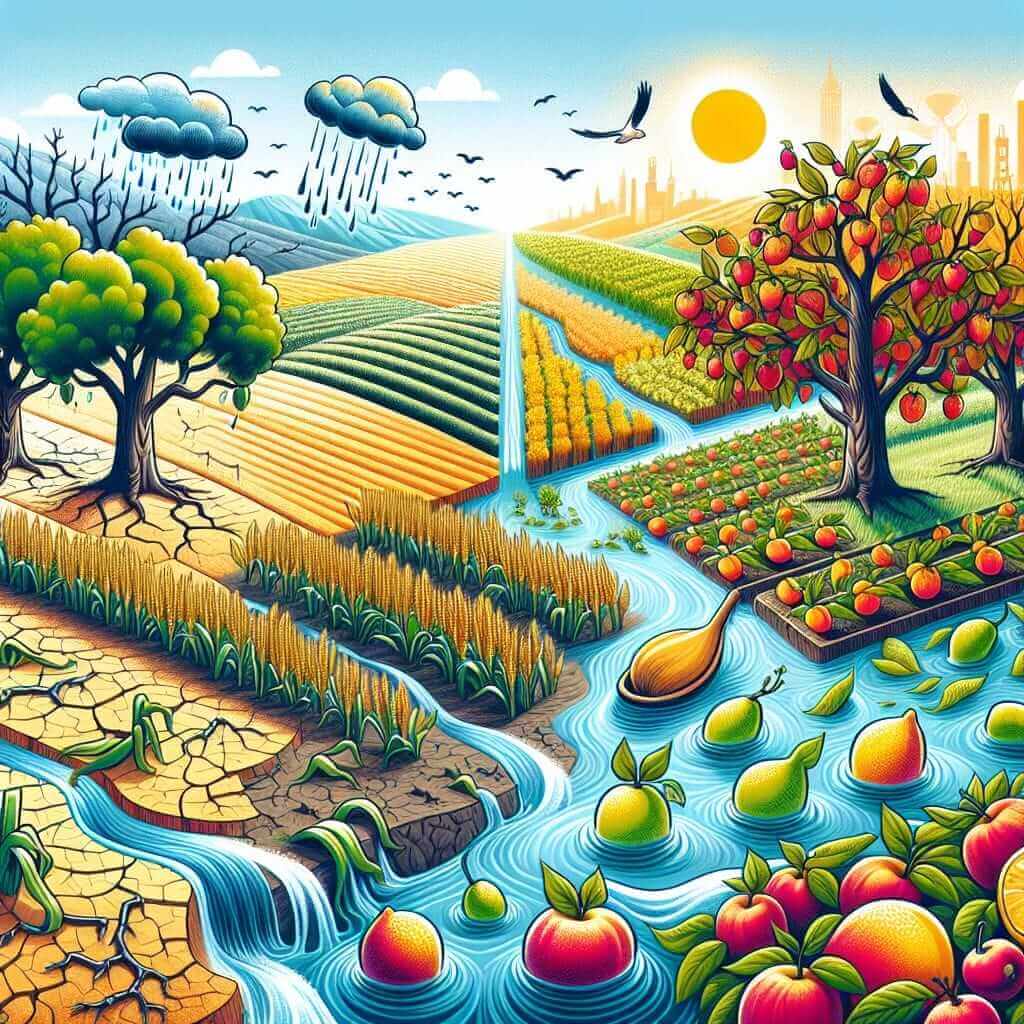The topic of “Food security and climate change” frequently appears in IELTS Writing Task 2. Given the increasing impact of climate change on global agriculture, it is a timely and relevant issue. Reviewing recent IELTS exams, it’s evident that this topic’s prevalence is rising. By understanding its nuances, candidates can better prepare for potential questions on this topic.
Sample Question
Below is a sample question that aligns closely with past IELTS exam questions on this topic.
Discuss both views and give your own opinion:
Some people believe that climate change affects food security, leading to food scarcity in many regions. Others argue that technological advancements can mitigate these effects and ensure stable food production. Discuss both views and give your own opinion.
Analyzing the Question
The question asks you to discuss both perspectives regarding the impact of climate change on food security and provide your viewpoint. This requires analyzing the negative effects of climate change on agriculture as well as the potential positive role of technology in countering these effects.
Sample Essay
Introduction
Climate change poses a significant threat to global food security. Some argue that climate change directly contributes to food scarcity, while others believe that technological innovations can counteract these negative effects. This essay will discuss both viewpoints before presenting my own perspective.
Body Paragraph 1: Impact of Climate Change
Climate change has undoubtedly affected food security in numerous ways. Extreme weather events, such as droughts and floods, have devastated crops, leading to significant food shortages in many regions. For example, prolonged droughts in Sub-Saharan Africa have drastically reduced agricultural yields. Furthermore, rising temperatures can alter growing seasons and affect the geographic distribution of crops, making traditional farming practices less effective. Consequently, these climate-related disruptions can jeopardize the stability of food supplies.
Body Paragraph 2: Role of Technological Advancements
On the other hand, technological advancements in agriculture offer promising solutions to mitigate the effects of climate change. Innovations such as genetically modified organisms (GMOs) and precision agriculture can enhance crop resilience to extreme weather conditions. For instance, drought-resistant crops developed through genetic modification can withstand prolonged periods of low water availability, ensuring consistent food production. Moreover, vertical farming and hydroponics allow for efficient farming in controlled environments, reducing dependence on weather conditions.

Body Paragraph 3: My Opinion
While technological advancements hold great potential in addressing food security challenges, they are not a panacea. Integrating sustainable farming practices with technological innovations is essential to address both environmental and food security concerns comprehensively. Investment in research and development is also critical to ensure that these technologies become accessible to farmers worldwide, particularly in developing countries where food security is most at risk.
Conclusion
In conclusion, while climate change poses substantial challenges to food security, technological advancements provide viable solutions to mitigate its effects. However, a holistic approach that combines sustainable practices with technological innovations will be more effective in ensuring global food security. Future IELTS questions on this topic may explore various angles, such as the role of government policies in promoting food security or the ethical implications of GMOs. By staying informed and practicing writing on these subtopics, candidates can enhance their preparation.
Word Count: 354
Key Considerations When Writing
Vocabulary and Grammar
- Vocabulary: When discussing food security and climate change, use precise terminology like “genetically modified organisms,” “precision agriculture,” “drought-resistant crops,” etc.
- Grammar Structures: Utilize complex sentences and passive voice to enhance formality, such as “are developed through genetic modification” or “is affected by changes in climate.”
Potentially Difficult Words
- Genetically modified organisms (GMOs) (noun) /ʤɛnəˈtɪkli mɒdɪˌfaɪd ˈɔrɡənɪzəmz/
- Organisms whose genetic material has been altered using genetic engineering techniques.
- Hydroponics (noun) /ˌhaɪdrəˈpɒnɪks/
- The method of growing plants without soil, using mineral nutrient solutions in an aqueous solvent.
- Resilience (noun) /rɪˈzɪliəns/
- The capacity to recover quickly from difficulties; toughness.
- Mitigate (verb) /ˈmɪtɪˌɡeɪt/
- Make less severe, serious, or painful.
- Precision agriculture (noun) /prɪˈsɪʒən æɡrɪˌkʌltʃər/
- A farming management concept based on observing, measuring, and responding to inter-and intra-field variability in crops.
Conclusion
“Food security and climate change” is a critical topic with increasing relevance in IELTS exams. Thorough understanding and preparation on this issue can significantly enhance one’s ability to respond effectively. Future IELTS questions may continue to explore related subcategories, offering diverse angles for students to tackle. Candidates are encouraged to stay abreast of current developments and continuously practice writing essays on these and related topics.
Additional Practice Questions
- “To what extent do you agree or disagree that climate change will lead to global food shortages?”
- “How can international cooperation play a role in ensuring food security in the context of climate change?”
- “What are the ethical considerations of using genetically modified crops to combat food scarcity?”
By addressing these questions and developing well-rounded arguments, candidates can refine their skills and be well-prepared for their IELTS exams.